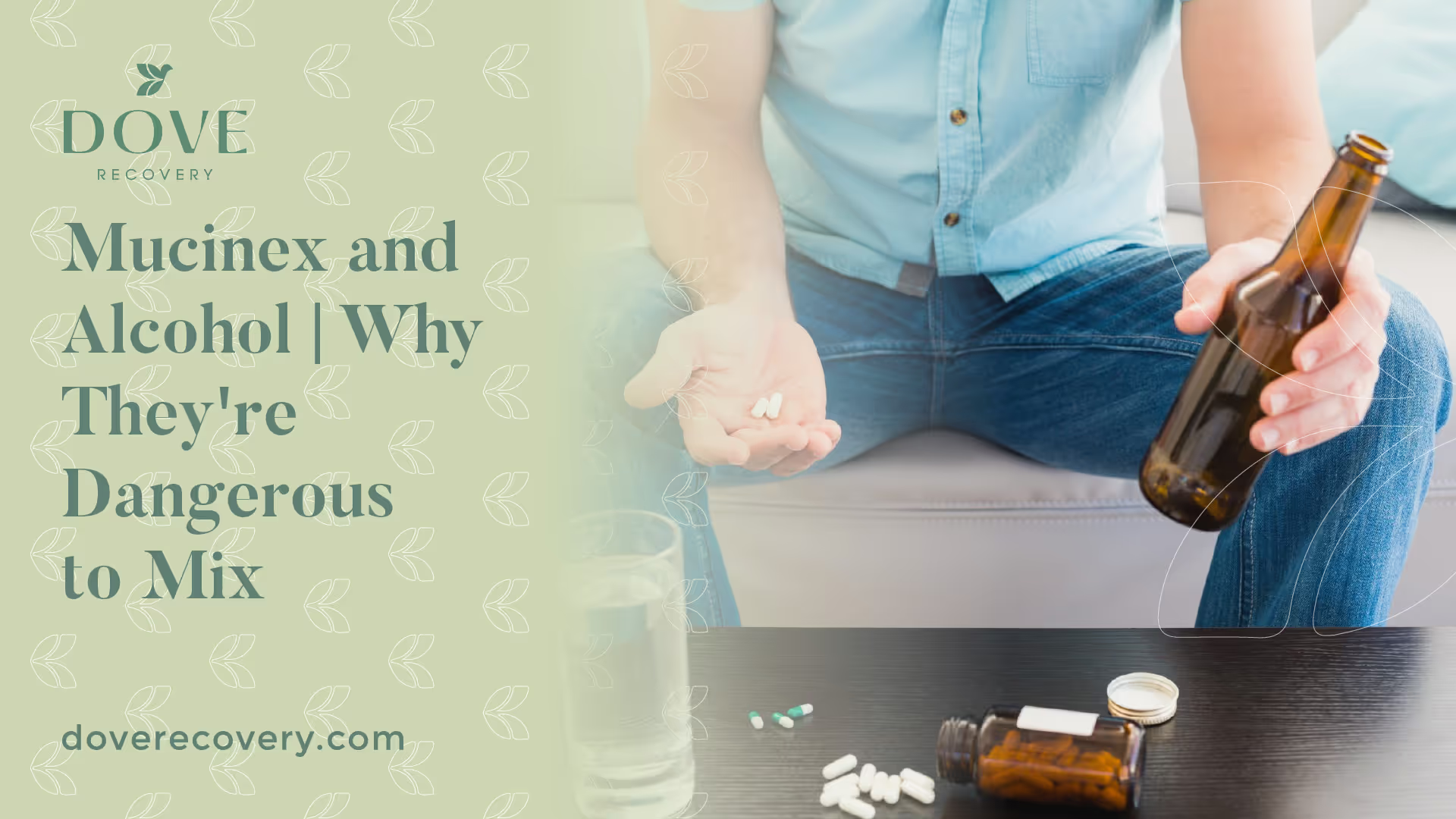Mucinex and Alcohol | Why They're Dangerous to Mix

Mucinex and Alcohol: A Dangerous Combination
When it comes to mucinex and alcohol interaction, caution should be exercised. Mixing these substances can have serious consequences for your health. Understanding the potential risks of combining mucinex and alcohol is crucial for making informed decisions about your well-being.

Understanding Mucinex and Alcohol Interaction
Mucinex is a commonly used medication that helps to relieve chest congestion and thin mucus in the respiratory tract. It contains an active ingredient called guaifenesin, which works by loosening and thinning mucus, making it easier to cough up.
Alcohol, on the other hand, is a central nervous system depressant that affects various bodily functions. It can impair coordination, judgment, and cognitive abilities. Consuming alcohol in excessive amounts can have detrimental effects on your overall health.
The Risks of Mixing Mucinex and Alcohol
Combining mucinex and alcohol can intensify the side effects of both substances and pose serious health risks. Here are some potential dangers of mixing mucinex and alcohol:
- Increased Risk of Side Effects: Both mucinex and alcohol can cause drowsiness and dizziness. When taken together, these effects can become more pronounced, leading to excessive sedation and impaired functioning. This can be particularly dangerous when engaging in activities that require alertness, such as driving or operating machinery.
- Impaired Judgment and Coordination: Alcohol is known to impair judgment, coordination, and reaction time. When combined with mucinex, these effects can be amplified, making it difficult to perform everyday tasks safely. This is especially concerning for individuals who may already be experiencing respiratory symptoms that affect their ability to breathe properly.
- Liver Damage and Toxicity: Both mucinex and alcohol can put a strain on the liver. Mucinex is metabolized in the liver, and excessive alcohol consumption can also lead to liver damage. Mixing these substances can potentially increase the risk of liver toxicity and long-term liver damage.
It is essential to prioritize your health and safety by avoiding the simultaneous consumption of mucinex and alcohol. If you are in doubt about the potential risks or have specific concerns about your situation, it is advisable to consult a healthcare professional. They can provide personalized advice based on your medical history and guide you towards safer alternatives for cold and cough relief.
By understanding the dangers of mixing mucinex and alcohol, you can make informed choices that promote your well-being and minimize potential harm. It is important to read and follow the warnings and instructions provided by healthcare professionals and on the medication packaging.
How Mucinex Works
To understand the potential dangers of mixing Mucinex and alcohol, it's important to have an understanding of how Mucinex works and how it affects the body.
An Overview of Mucinex
Mucinex is an over-the-counter medication commonly used to relieve symptoms of cough and congestion associated with respiratory conditions such as the common cold, flu, or allergies. The active ingredient in Mucinex is guaifenesin, which works by thinning and loosening mucus in the airways, making it easier to cough up and clear from the body.
Mucinex is available in various forms, including tablets, extended-release tablets, liquids, and syrups. It is important to follow the recommended dosage instructions provided on the product packaging or as directed by a healthcare professional.
How Mucinex Affects the Body
When ingested, guaifenesin, the active ingredient in Mucinex, is absorbed into the bloodstream and distributed throughout the body. It acts on the respiratory system by increasing the volume and reducing the viscosity of mucus in the airways.
By thinning the mucus, Mucinex helps to promote easier breathing and relieve congestion. This can provide temporary relief from coughing, chest congestion, and the associated discomfort caused by respiratory conditions.
It's important to note that Mucinex primarily targets the respiratory system and does not directly interact with alcohol in the body. However, the effects of alcohol on the body can potentially impact the way Mucinex is processed and metabolized.
Understanding how Mucinex works and its effects on the body is essential in comprehending the potential risks and dangers associated with combining it with alcohol. It is always advisable to consult a healthcare professional or pharmacist regarding the safe use of Mucinex, especially if you have any pre-existing medical conditions or if you are taking other medications.
Effects of Alcohol on the Body
Understanding how alcohol interacts with the body is crucial when considering the potential dangers of mixing alcohol with Mucinex. Alcohol affects various physiological processes and can have detrimental effects on overall health and well-being.
How Alcohol Interacts with the Body
When alcohol is consumed, it is rapidly absorbed into the bloodstream through the stomach and small intestine. It then travels to various organs, including the liver, where it is metabolized. Alcohol acts as a depressant on the central nervous system, affecting neurotransmitters and altering brain function.
Alcohol affects cognitive function, motor skills, and coordination. It can impair judgment, reaction time, and decision-making abilities. Additionally, alcohol can lead to dehydration, as it acts as a diuretic, increasing urine production and potentially causing electrolyte imbalances.
The Risks of Excessive Alcohol Consumption
Excessive alcohol consumption can have serious consequences on both short-term and long-term health. Some of the risks associated with excessive alcohol consumption include:
- Physical Health Risks: Chronic heavy drinking can lead to liver damage, such as alcoholic hepatitis, cirrhosis, and liver cancer. Alcohol abuse can also contribute to cardiovascular problems, including high blood pressure, irregular heart rhythms, and an increased risk of stroke.
- Mental Health Risks: Alcohol misuse is associated with an increased risk of mental health disorders, including depression, anxiety, and alcohol use disorder. It can exacerbate existing mental health conditions and impair overall psychological well-being.
- Social and Behavioral Risks: Excessive alcohol consumption can lead to risky behaviors, including impaired judgment, aggression, and engaging in unsafe sexual practices. It can also negatively impact personal relationships, work performance, and overall quality of life.
Understanding the effects of alcohol on the body highlights the importance of avoiding its combination with Mucinex. Mixing these substances can intensify the risks and potentially lead to severe health consequences.
It is crucial to prioritize your health and make informed decisions when it comes to the use of medication and alcohol. If you have any concerns or questions about the potential interactions between Mucinex and alcohol, it is advisable to consult a healthcare professional for guidance and personalized advice.
Potential Dangers of Mixing Mucinex and Alcohol
Combining Mucinex and alcohol can lead to a range of potential dangers and adverse effects. It is important to understand the risks associated with this combination to make informed decisions about your health and well-being.
Increased Risk of Side Effects
When Mucinex, a medication commonly used for cough and cold relief, is consumed alongside alcohol, the risk of experiencing side effects is significantly increased. Both substances can cause drowsiness and dizziness individually, but when combined, these effects can be intensified, potentially leading to a higher risk of accidents or injuries.
Additionally, alcohol can impair the effectiveness of Mucinex in relieving symptoms. It may also interfere with the body's ability to absorb the medication properly, reducing its overall efficacy.
Impaired Judgment and Coordination
Alcohol acts as a central nervous system depressant, affecting cognitive function, judgment, and coordination. When combined with Mucinex, these effects can be amplified, leading to impaired judgment and coordination. This can be dangerous, especially when engaging in activities that require focus and alertness, such as driving or operating machinery.
It is crucial to prioritize your safety and avoid engaging in any potentially risky activities while under the influence of both Mucinex and alcohol.
Liver Damage and Toxicity
Both Mucinex and alcohol are processed by the liver. Consuming alcohol while taking Mucinex can place additional stress on the liver, potentially leading to liver damage and toxicity. The liver plays a vital role in metabolizing substances in the body, and excessive alcohol consumption can already strain this organ. Adding Mucinex into the mix can further exacerbate the liver's workload, increasing the risk of liver-related complications.
To protect your liver health, it is advisable to refrain from consuming alcohol while taking Mucinex. If you have any concerns or questions regarding the interaction between Mucinex and alcohol, it is important to consult a healthcare professional for guidance.
Understanding the potential dangers of mixing Mucinex and alcohol is essential for making informed choices about your health and well-being. It is always best to err on the side of caution and avoid combining these substances.
Safety Precautions and Alternatives
When it comes to using Mucinex for cold and cough relief, it's essential to take certain precautions to ensure your safety and well-being. Additionally, exploring safer alternatives and consulting a healthcare professional can help you make informed decisions regarding your health.
Precautions to Take When Using Mucinex
When using Mucinex, it's important to follow these precautions to minimize the potential risks and complications:
- Read the label: Carefully read and follow the instructions provided on the Mucinex packaging. This includes dosage information, frequency of use, and any specific warnings or contraindications.
- Avoid alcohol: It is strongly advised to avoid consuming alcohol while taking Mucinex. Alcohol can interact negatively with the active ingredients in Mucinex, potentially leading to adverse effects.
- Stay hydrated: Drink plenty of fluids, such as water, to keep yourself hydrated while taking Mucinex. This helps to thin mucus and promote its expulsion, aiding in the relief of congestion.
- Follow recommended dosage: Stick to the recommended dosage of Mucinex as indicated on the packaging or as advised by your healthcare professional. Taking more than the recommended dose can increase the risk of side effects.
- Monitor for side effects: Be aware of any potential side effects associated with Mucinex, such as dizziness, drowsiness, or gastrointestinal discomfort. If you experience any severe or persistent side effects, discontinue use and consult a healthcare professional.
Safer Alternatives for Cold and Cough Relief
If you prefer to avoid the potential risks associated with the combination of Mucinex and alcohol, there are alternative options available for cold and cough relief. These alternatives include:
- Non-alcoholic cough syrups: Consider using cough syrups that do not contain alcohol. These formulations can effectively help alleviate cough symptoms without the risk of alcohol interaction.
- Natural remedies: Explore natural remedies such as honey, ginger, or herbal teas to soothe cough and congestion symptoms. However, it's important to note that these remedies may not provide the same level of relief as medication.
- Consult a healthcare professional: If your symptoms persist or worsen despite using over-the-counter remedies, it is advisable to consult a healthcare professional. They can evaluate your condition and recommend appropriate treatment options tailored to your specific needs.
Consulting a Healthcare Professional
When in doubt or if you have concerns about the interaction between Mucinex and alcohol, it is always best to consult a healthcare professional. They can provide personalized advice, taking into consideration your medical history, current medications, and specific health needs. A healthcare professional can guide you on the safe and appropriate use of Mucinex and suggest alternative treatment options if necessary.
Making informed decisions and prioritizing your health is essential when managing cold and cough symptoms. By following precautions, considering safer alternatives, and seeking professional guidance, you can ensure the best course of action for your well-being.
Conclusion
Taking care of your health should always be a top priority. When it comes to taking medication, it's important to follow the recommended dosage and precautions to avoid potential risks. Similarly, consuming alcohol responsibly and in moderation can help minimize the negative effects on your body. By being informed and making smart choices, you can protect your well-being and enjoy a healthier life.
Sources:
- https://www.drugrehab.com/addiction/alcohol/risks-of-mixing-alcohol/mucinex/#:~:text=You%20shouldn't%20drink%20alcohol,can%20also%20cause%20liver%20damage.
- https://www.medicalnewstoday.com/articles/mucinex-and-alcohol
- https://www.drugs.com/food-interactions/dextromethorphan-guaifenesin,mucinex-dm.html
